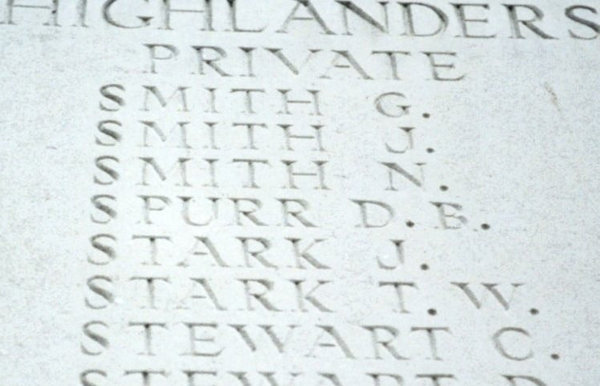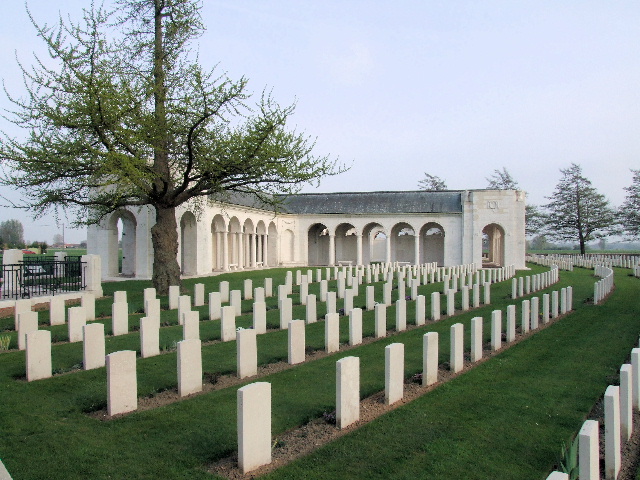Name
Douglas Bateman Spurr
2nd March 1896
Conflict
First World War
Date of Death / Age
10/03/1915
19
Rank, Service Number & Service Details
Private
2116
Cameron Highlanders
4th Bn.
Awards: Service Medals/Honour Awards
1914 /15 Star, British War and Victory medals
Cemetery/Memorial: Name/Reference/Country
LE TOURET MEMORIAL
Panel 41-42
France
Headstone Inscription
NA
UK & Other Memorials
Hitchin Town Memorial, St Mary's Church Roll of Honour (Book), Hitchin, Stained Glass Window, Hitchin Boys Grammar School
Pre War
Douglas was born on 2 March 1896 in Hitchin and christened on 17 April 1896, in St Mary’s Church, Hitchin, Herts. His parents were George Edmondson and Ethel Mary Spurr and (née Cropper), they were married in 1885.
His father was from Piddletrenthide, Dorset and his wife from Derby. He became involved in a large linen drapers Hitchin when he went into partnership with Mr Perry between 1886 and 1890. The premises were at 14 Market Place, initially it was known as Perry & Spur, but in 1899 it became known as George Spurr Ltd. And the family lived in rooms on the premises.
In 1891 ,before the birth of Douglas, the family were both parents: George (32) and Ethel (31), the census recorded George as a draper, milliner, and dressmaker. Their children were: Hilda Mary (5), Dorothy (3), Barbara (2), Anthony George (1) and Walter Gunnis at 2 months. Also present in the census were nine boarders connected with the business or domestic servants.
In 1901, both parents were still present – George now described as a draper, clothier and employer working from home. Their children included all those listed above plus Percy W (6), Douglas B (5), Richard K (1). Also present were three domestic servants and seems no workers were now boarding.
He attended the Hitchin Grammar School Kindergarten. He stayed at the school for the period 1904-1910. He was well known to masters and schoolfellows alike for his unvarying cheerfulness of disposition and his enthusiasm for all that was best in work and play. On leaving school he became an auctioneer with Messrs George Jackson of Hitchin.
By 1910 George Spurr had bought number 15, a much larger shop, and his shop became a much larger department store that almost stretched the length of one side of the Market Place.
By 1911 the family had moved out of the shop and were living in Wymondley Road, Hitchin. Both parents were there, George now recorded as a draper and clothier dealer. The census recorded they had been married for 26 years with 10 children, of whom 1 had died. Six of their children were still present including Douglas at 15 working as an auctioneer’s clerk. Two other brothers who also died were absent Walter (20) was and Anthony (21).
Officially Douglas was recorded as living in Hitchin and enlisting in London. Middx.
Wartime Service
By the 19th September 1914 Douglas had already enlisted in Hitchin to become Private No. 2116 in the l/4th Battalion, which was in the 24th Brigade of the 8th Division of IV Corps in the 1st Army. He was billeted in Bedford before going to France and he arrived at Le Havre in France on the 19th February 1915 with the rest of the Battalion. A shell killed him.
A local newspaper reported that Anthony, Douglas is brother, had received the sad news of his death when passing the Camerons on his way to the trenches and he later wrote to his parents giving them the sad news.
The incident which led to his death occurred at the Battle of Neuve Chapelle when an attack by the 23rd and 25th Brigades captured the village by 11.00am on the 10th March 1915. At 1.00pm the 24th Brigade was ordered to advance towards Aubers and sustained repeated and very strong counter-attacks from the Germans causing very heavy casualties. The British casualties for the day were over 12,000 men.
He has no known grave, but is remembered on Panels 41 or 42 of the Le Touret Memorial to the Missing in France.
Additional Information
After his death £4 11s 4d pay owing was authorised to go to his father on 9 June 1915. Later, a war gratuity of £3 was authorised to be paid to him on 19 August 1919.
Douglas was the first of three sons to be killed, two of his elder brothers died; Anthony George on 9 May 1915 and Walter Gunnis Spurr on 22 August 1916, and he was the first ex-Hitchin Grammar School boy to be killed during the Great War.
Acknowledgments
Adrian Dunne, David C Baines, Jonty Wild



